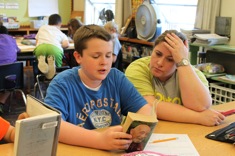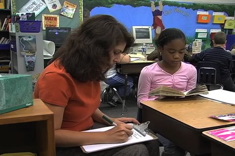Reading conferences are an important part of the teacher’s work during independent reading. The conversations we have with students during this time are meant to provide us with valuable information about students’ reading processes, helping us to know how well students are integrating the skills and strategies we have taught in other instructional contexts. However, conferring can be a tricky business, and getting the type of information we are looking for during a conference depends on many variables, including the types of questions and prompts we use to initiate conversations with students.
Thinking in advance about what we will say to students can help reduce some of the angst commonly felt around having high-quality talks with students about their reading. We suggest “trying on” the questions and prompts you are considering, using the following questions as guidelines for deciding which ones will work best:
-
What is the student likely to say in response?
Because the idea behind a conference is to collect important information about children’s reading processes, asking questions that open the floodgates of student talk is important. Open-ended questions are usually the best for making this happen. However, sometimes even open-ended questions don’t prompt the kind of talk we are looking for. For example, a question such as “How’s it going?” is open ended, but if you think about what the student is likely to say in response, you quickly realize that this opener might be cut short by a one-word response, such as “Fine” or “Good.” Instead, try a question like “What are you thinking about?,” which is open ended but much less likely to have a generic response. Even if the student response is “Nothing,” your next move is pretty clear because, if true, thinking about nothing while you read reveals a passive reading process.
-
How will my questions make students feel?
Ideally, conferences are conversational and informal. Because students are reading independently, we want the talk that happens during this time to mimic the authentic conversations readers have around books. For example, “What are you reading?” is a question we ask each other all the time. It feels natural, and when we’re asked this question, we feel cared about, because someone is expressing an interest in something we are doing. A question such as “What are you working on as a reader?,” on the other hand, feels interrogational. It feels like a “teacher question,” which can cause a student to tense up and shift the tenor of the conversation. Subtle differences in the way we word questions—“What is the main idea?” versus “What is your book about?”—can strongly influence the tone of the conversation.
-
How does the question empower students?
Some questions accentuate student power and agency, whereas others assert teacher control. For example, a question such as “What appealed to you about this book?” or “How did you know this book would be just right for you?” reinforces the idea that students are in charge of their text choices and that we assume they make these choices thoughtfully. On the other hand, a question such as “What inferences are you making?” communicates that the teacher is ultimately in charge. Student inferences can be revealed through the questions that let students remain in control.
Developing and refining conferring questions and prompts is an ongoing process, and we encourage you to embrace a growth mind-set as you experiment with conferring language. Some prompts will fall flat, and a few will feel magical, but most will provide opportunities for reflection and refinement. Don’t be afraid to say the “wrong” thing, as the work is simply about reflection and improvement. Be kind to yourself; you have many opportunities to appreciate your students as learners and show them that you see them.









